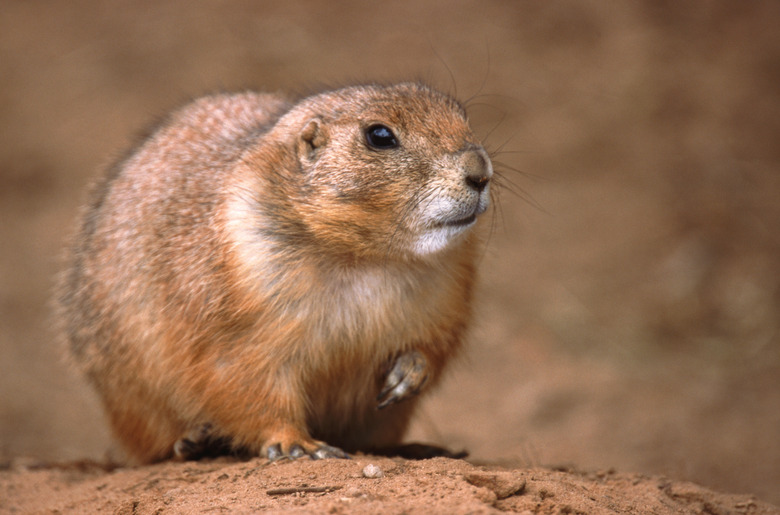What Are The Differences Between A Groundhog & A Prairie Dog?
Both groundhogs and prairie dogs are members of the squirrel family of rodents, Sciuridae, which means "shadow-tail." All species in this family have four toes on their front feet and five on their hind feet. Their eyes are set high on their heads so they can watch for predators. Both groundhogs and prairie dogs eat seeds and grasses. Sounds like they have a lot in common, right? Well, although groundhogs (also called woodchucks) and prairie dogs share many traits and habits, they are easily distinguishable by their many differences, especially their appearance. Here's how to tell which is which.
How They Look
How They Look
Usually a grizzled brown, groundhogs can also be black or white. Their belly fur is usually straw-colored and their feet are black. They are stocky animals with a flattened head and weigh four and a half to almost nine pounds, making them one of the larger members of the Sciuridae family. Groundhogs are 16 to 25 inches in total length including their short bushy tail.
The most common of the five species of prairie dog is the black-tailed prairie dog. About the size of a rabbit, they are much smaller than a groundhog at about two to four pounds and 12 to 15 inches long. They have brown fur with white belly fur, large eyes and stubby white or black-tipped tails, which are much shorter than a groundhog's.
Differences in Behavior
Differences in Behavior
Groundhogs were named monax, meaning "the digger," by Native Americans. These burrowing animals have strong claws and thick, muscled legs. In some soils they can burrow out of sight in less than a minute. Their tunnels may be 45 feet long and three to six feet deep. Caught by a predator away from a burrow, the groundhog will even climb a tree.
Toward the end of summer, groundhogs grow fat on grasses as they get ready to hibernate. One of the largest true hibernators, scientists study how groundhogs slow their hearts, lower their body temperature and reduce their oxygen uptake.
Prairie dogs, unlike groundhogs, form strong family groups of a male, a female and their young and share the same burrow. They work together to share food, chase off other prairie dogs, groom each other and socialize. Although not true hibernators, prairie dogs spend much of the winter regulating their body temperature in a manner called facultative torpor. They pop out of their burrows to eat grasses, roots and seeds on warm winter days.
Where You'll Find Them
Where You'll Find Them
Groundhogs are found in many parts of North America, primarily in the eastern United States, eastern provinces of Canada, the Canadian west and Alaska. They live along the edges of woods in open areas such as fields. They avoid swampy areas and dig burrows near good supplies of grasses.
Black-tailed prairie dogs are found in the midwestern states of the United States and up into Canada's western provinces, in open prairies and grasslands. They work together to build a "town" composed of tunnels and burrows and spend much of their life excavating and rebuilding. The largest recorded prairie dog town covered about 25,000 square miles!
How They Sound
How They Sound
Groundhogs give a shrill whistle to warn other groundhogs of danger. They squeal or make a sound like a low bark when fighting or injured and also can make sounds by grinding their teeth.
Prairie dogs have many distinct calls, most in the form of whistles. They can express territorial rights, well-being and danger by varying the pitch and volume of their whistles. Sentries are posted to defend the towns, and a high-pitched rapid barking means danger to the colony.
Cite This Article
MLA
Davidson, Elaine. "What Are The Differences Between A Groundhog & A Prairie Dog?" sciencing.com, https://www.sciencing.com/difference-between-groundhog-prairie-dog-8092215/. 30 September 2021.
APA
Davidson, Elaine. (2021, September 30). What Are The Differences Between A Groundhog & A Prairie Dog?. sciencing.com. Retrieved from https://www.sciencing.com/difference-between-groundhog-prairie-dog-8092215/
Chicago
Davidson, Elaine. What Are The Differences Between A Groundhog & A Prairie Dog? last modified March 24, 2022. https://www.sciencing.com/difference-between-groundhog-prairie-dog-8092215/
